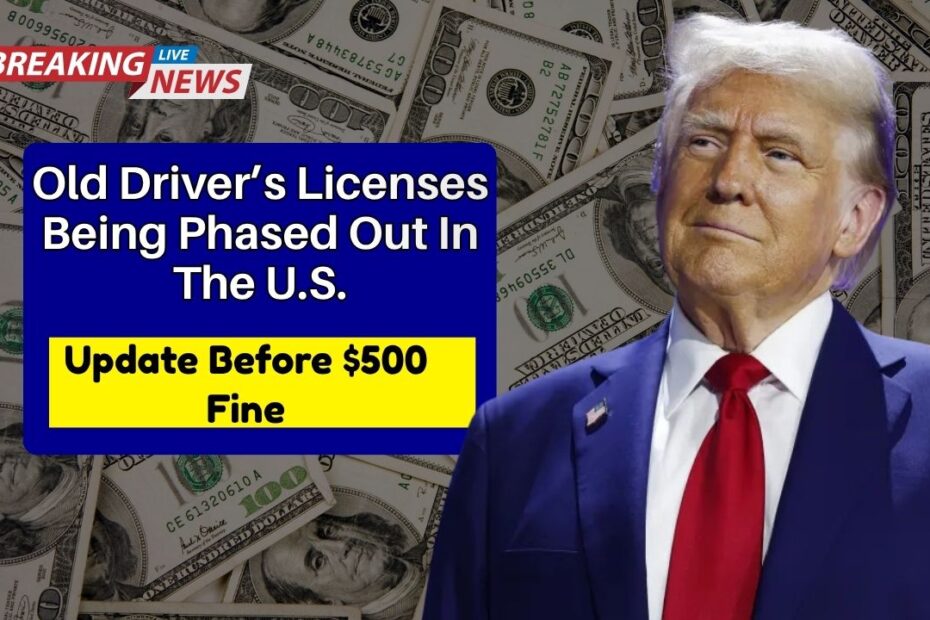Across the United States, millions of residents are being urged to update their old driver’s license as new federal and state identification standards take effect.
With the nationwide shift toward REAL ID-compliant licenses, outdated IDs may no longer be accepted for essential purposes such as domestic flights, federal building access, and in some cases, state-level driving validations.
As enforcement grows, many states warn that failing to update your license could result in penalties — with fines in some jurisdictions reaching up to $500 for driving with an expired or invalid license.
This guide explains what’s changing, why it matters, and how you can avoid costly penalties and travel delays.
Why Old Driver’s Licenses Are Being Phased Out
The shift away from old driver’s licenses is driven primarily by nationwide adoption of REAL ID security standards.
These upgraded IDs contain enhanced features such as advanced verification, added security layers, and a star marking that confirms compliance.
While not every American is required to obtain a REAL ID, those who do not upgrade may face key restrictions, including:
- Inability to board domestic flights using a standard ID
- Denial of access to certain federal facilities
- Potential penalties if the license on file is expired or invalid
- Additional identity checks at airports and federal buildings
For many, updating the license is no longer optional — it is a requirement for smooth travel and legal driving.
Possible $500 Fine- What It Really Means
It is important to clarify that the federal government does not issue a universal “REAL ID fine.”
However, states impose their own penalties for driving with an expired or invalid license, and in several states, those penalties can reach $500 or more, especially when combined with reinstatement fees or additional violations.
Common situations that may trigger fines include:
- Driving with an expired license
- Failing to renew your license within the state’s allowed grace period
- Operating a vehicle with an ID classified as invalid or non-compliant
- Providing outdated identification during traffic stops
Even if your old license still looks valid, if it does not meet updated state or federal standards, penalties may apply depending on your jurisdiction.
Key Information at a Glance
| Category | Details |
|---|---|
| Reason for change | Transition to REAL ID and updated state security standards |
| Primary risk | Old licenses may not work for flights or federal building entry |
| Possible penalties | State fines for expired/invalid licenses, sometimes up to $500 |
| What a REAL ID looks like | Usually includes a gold, black, or white star in the top corner |
| Update method | In-person DMV visit with required documents |
| Accepted alternatives | Passport, passport card, military ID, or other federal-approved IDs |
What You Need to Update Your License
To switch from an old driver’s license to a REAL ID-compliant one, most DMVs require:
- Proof of identity (birth certificate, passport)
- Proof of Social Security number (SSN card, W-2)
- Two proofs of residency (utility bill, rental agreement)
- Existing driver’s license
Some states allow partial online applications, but nearly all require an in-person appointment for document verification.
Why You Should Update Now
Updating your driver’s license early reduces the risk of:
- Long DMV wait times
- Travel disruptions
- Secondary identity screening
- State-issued fines for expired or non-compliant licenses
- Difficulty renewing online
As enforcement increases nationwide, delays and appointment shortages have become common. Updating now ensures you stay legally compliant and avoid financial penalties.
The transition away from the old driver’s license is part of a nationwide effort to improve security and identity verification.
While the federal rules focus on travel and access to federal buildings, individual states enforce the validity of driver’s licenses — meaning fines of up to $500 are possible if your ID is outdated or expired.
The safest step is simple: update your license now, gather the required documents, and avoid last-minute delays, travel issues, or costly penalties.
FAQs
Is everyone required to get a REAL ID?
No. You only need a REAL ID if you plan to board domestic flights or enter certain federal facilities using a state-issued ID. A passport can still be used as an alternative.
Does not upgrading mean I will automatically be fined?
Not automatically. Fines apply when a license is expired or invalid under state law, not simply because it is not REAL ID-compliant.
How do I know if my current license is REAL ID-compliant?
Look for a star symbol in the upper portion of the card. If your license has no star, it is likely non-compliant.
